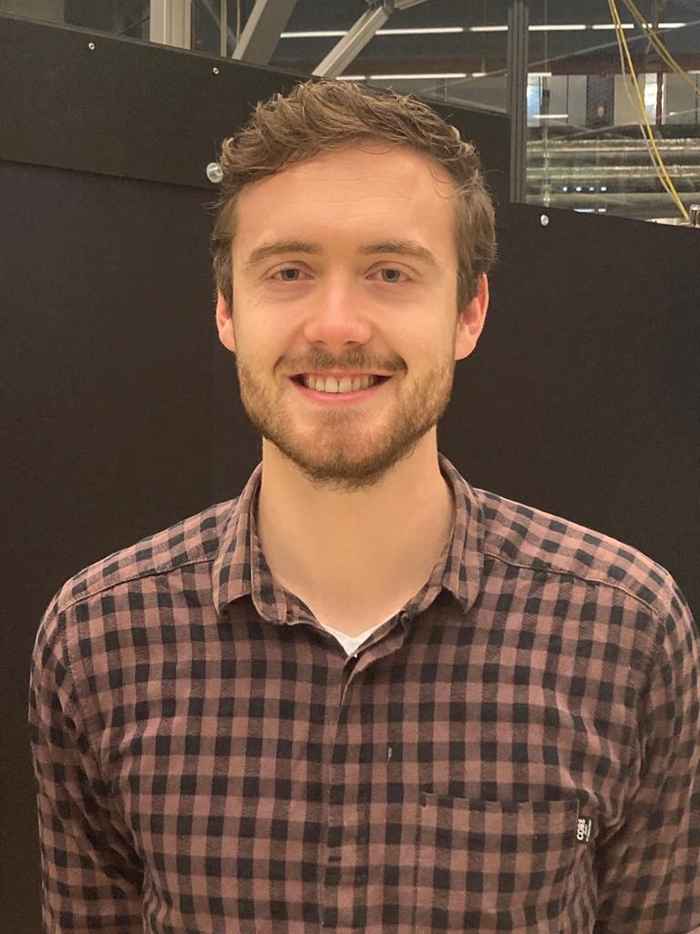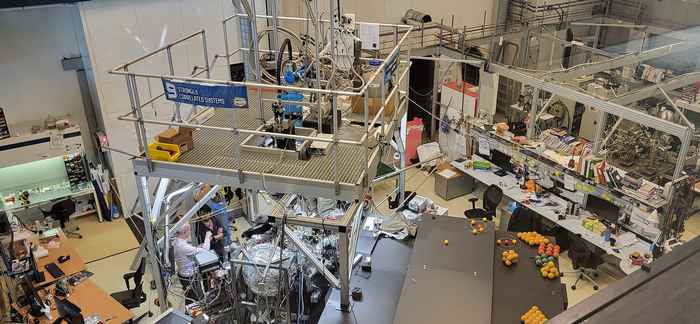Steef Smit receives Rubicon grant for superconductivity research in Canada
4 May 2023

We asked Smit about his research, his Rubicon plans and the reasons he chose to go to Canada.
IoP: Last year, you obtained your PhD, graduating in the field of condensed matter. What made you choose a PhD in that research area?
Smit: I did my PhD in the Van der Waals-Zeeman institute, one of the three institutes that together form the Institute of Physics. I did my research in the group of Mark Golden. Having studied physics at the UvA, I already knew Mark, and after my master’s project I continued working in his group. As a student I was already fascinated by condensed matter, and I was inspired by the opportunity to work with the impressive machine in the big experiment hall.
IoP: Can you explain what you investigate in your research?
Smit: I investigate cuprate superconductors, a class of materials that lose their resistance already at relatively high temperatures – and for which no complete theory is currently known. In Canada I will perform ultrafast photo-emission experiments: using pulsed lasers we ‘kick’ electrons out of a material, and then measure their energy and momentum. From these data we can determine the electronic properties of the superconductor, which will hopefully allow us to learn more about the origins of the superconductivity.
IoP: In Canada you will continue your research at the University of British Columbia (UBC). Why did you choose that particular location for your Rubicon proposal?
Smit: One important reason to go to UBC was the research group in the Quantum Matter Institute. The group is very strong when it comes to photo-emission, and the professor I will work with, Andrea Damascelli, is one of the leading researchers in the field. On top of that, the group recently started developing a new experimental technique, 2e-ARPES. Using this technique, it should be possible to measure multiple electrons and their interactions simultaneously. These measurements are particularly interesting for superconductors, because superconductivity is caused by electrons that form pairs, so called ‘Cooper pairs’. Being involved in the development of such a new experimental technique would be very interesting to me – especially since it has the potential to have a large impact on our field of research. There are many things that we do not understand about these Cooper pairs yet, so there is much to be discovered. Finally, Vancouver is simply a great city to live in for a while: having mountainous areas as well as the ocean nearby, certainly helped in choosing the location.
We also asked Smit’s former supervisor, Mark Golden, about the Rubicon grant that Smit obtained.
IoP: Congratulations to Steef’s former supervisor as well! Are you proud of his achievement?

Golden: I was always very impressed by how Steef grew as a researcher during his educational and research journey. He is an extremely capable and productive experimentalist and certainly a very well-deserving Rubicon winner. I am very proud of him! His PhD was part of an NWO consortium ‘Strange Metals’. Steef participated actively in the strong network of collaborations between experiment and theory groups, with papers published or submitted from his PhD with all six other groups in the consortium (4 experiment, 2 theory), and he added a cum laude graduation as icing on the cake. The match with the Damascelli ARPES lab in QMI is a perfect one. Steef can build on his strong foundations in ARPES and take the next steps in helping to develop 2e-ARPES, which will add a completely new window on the superconducting world. Finally, I add that Steef is also a very nice person and a great help to those around him as I am sure the QMI ARPES group are discovering to their benefit. I wish him every success, and am happy to continue to collaborate with him in our own forthcoming experiments at the Canadian Light Source.
Finally, of course, we asked Smit about his expectations for the two years in Canada.
IoP: Are you looking forward to working at the University of British Columbia for the next two years?
Smit: Definitely! All of my undergraduate and graduate studies have been at UvA, so I view this as a great opportunity to get a broad research experience, and to develop as a physicist in an international setting. I hope to find out whether a career in science is an option for me. The Rubicon grant is certainly a good step in that direction!
Rubicon
For many researchers, experience abroad is an important step in their career. The Rubicon programme gives young, highly promising researchers the opportunity to gain international research experience. Thanks to the Rubicon grant they can do their research at a foreign institute that offers the best environment for their research. The size of the grant is dependent on the destination chosen and the duration of the stay. Each year, NWO and ZonMw fund about 60 young researchers within Rubicon, for a total amount of 7 million euros allocated over three rounds.